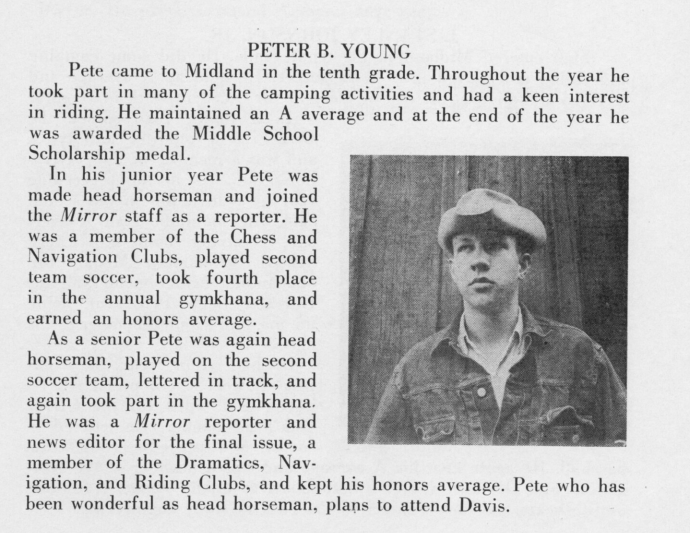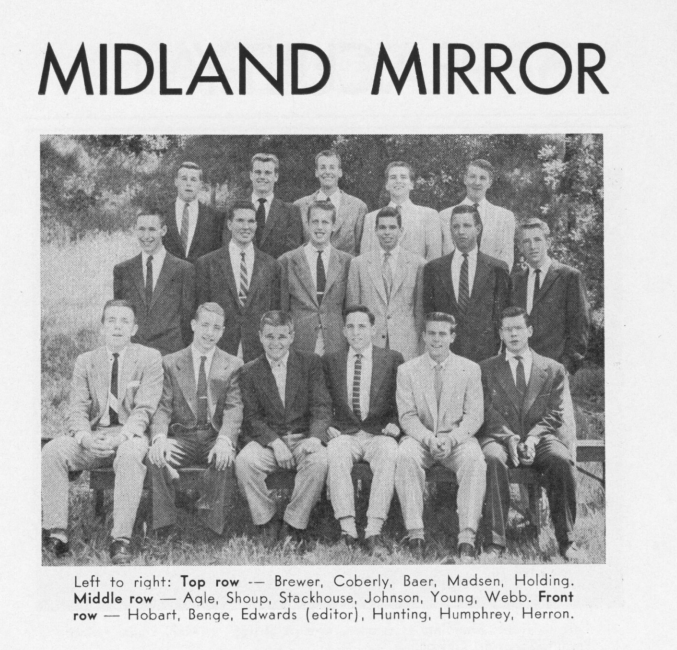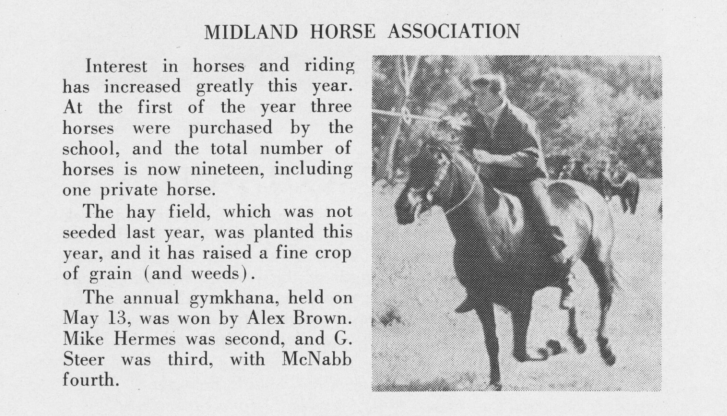Contact Information
-
MAILING : P.O. Box 8, Los Olivos, CA 93441
Interview with Peter Young '56
First of all, give us a brief introduction. How did you end up at Midland School after your family moved from New York to the west coast?
My two brothers went to Midland as well, William class of ’45, and Richard class of ’42. My dad was a professor at Occidental College and attuned to private schools. They were looking for a good college prep situation. My brothers were at Midland during the kerosene age, rural electrification was not there yet. We did still use kerosene in the mid-1950s too, with a round wick kerosene for heating. The school still provided kerosene for us. I went to Polytechnic School in Pasadena for grades 1-9. which was as far as it went in those days, so on to Midland.
Tell us about your time as a Midland student. We know you have a passion for animals and spent time as Head of Horses, and you were also interested in theater.
In 12th grade, the English teacher Tony Dunn got us doing a production of Blackboard Jungle, in the old Playhouse. We were planning to do it for Thanksgiving. But, I think at the last minute, Dan Rich got cold feet and decided maybe it wasn’t appropriate for the audience. For its time, it was an edgy thing. That’s the only dramatic experience I remembered doing at Midland.
My parents, who had moved out West from NYC two years before I was born, were regular theatergoers and took me to see my first non-school production at the Pasadena Playhouse in 1949. I went to the theater regularly in LA and Hollywood from my Midland days on. Those were the days when Broadway shows regularly toured, and the Theatre Guild had their own season as well.
When I was in the lower and middle school grades at Poly, I always did the school plays and things. I had this horrible stage fright, but I volunteered, asking “Can I pull the curtain?” That got me interested in all the things backstage. Building scenery, designing, directing. I did some acting, but I’ve been very happy being a designer.

Midland Mirror entry on Peter Young ’56
Now you started your college career focused on Animal Husbandry and Agronomy and eventually majored in Botany at UC Davis, but you ended up squeezing in all the theater classes you possibly could before graduating. How did you balance these different academic and creative interests?
I went to UC Davis, which then only had about 2500 students I think. I was in the College of Agriculture for two years, first declaring a major in Animal Husbandry then switching after a semester to Agronomy. But after two years I realized that becoming a cattle rancher was an impractical romantic dream with no money or land in the family to get me a ranch! That stemmed from my love of riding at Midland, which I did every half-holiday and Sunday afternoon. At Davis, I liked plant science, so I became a Botany Major my junior year, which is actually what my BA is in.
At Davis, I did extra-curricular theater every semester and I was hooked. I was doing something each semester thereafter: acting, building scenery, etc. Each of my majors had a lot of science classes, so I didn’t have time to fit a theater course into my schedule until the start of my senior year. I had known for some time that I wanted to teach in college or university, and now I knew that I wanted to teach theater. Theodore Shank was then a one-man department at Davis and a Stanford graduate, so he said I didn’t need to declare a major (which was a combined speech and drama track and would have taken even longer to complete) but just take all the theater courses I could, and grad school admission would be no problem. He was right.
Because of my several changes of major and even colleges, it took me nine semesters to graduate. That gave me time senior year to join my theater friends and finally take all but one of the theater courses available. As seniors we each directed a one-act play, and then I designed and ran the lighting for a production of The Cretan Woman, the Robinson Jeffers retelling of the Greek story of Hippolytus and Phaedra. We toured that production to UC Berkeley, which is yet another story. While at Davis I also went to see plays at various little theaters in LA and Hollywood.
Are you getting the idea that once you get me started it’s hard to stop me going on about either Midland or the theater?
I taught one year in Little Rock at UALR. Fortunately the University of West Florida hired me, and here I am still in Pensacola. We missed California, but it had become a place very unlike the state we had grown up in. So Pensacola is now home. Aside from a good job, one of the perks of Pensacola is great sailing, and I’ve had two boats here, one of which we trailed all the way across the country from the Bay Area to Illinois, Arkansas and finally Pensacola.

Midland School Class of 1956
You’ve been able to teach and live abroad as well, in London. How has living overseas affected your approach to dramatic craftsmanship, or to your perspective on life?
That’s a marvelous perk of teaching. You are eligible for a sabbatical every seven years. It doesn’t mean you always get one, because people are competing, but eventually your turn comes around. I’ve had a couple of sabbaticals. I’ve also taught in Florida State’s London study program a couple times. They always wanted someone to teach a theater course. They need a general course that helps satisfy graduation requirements. Then you can teach something more special in your field. So I did an intro to theater, they always needed someone because finding a temporary theater teacher is difficult, they are so busy. It’s an easy appointment to get if you can get your home department to let you go. It was very valuable. I did that a couple times. My wife and I loved London so much. I’ve taught on the London Program twice and taken two sabbaticals there.
Living abroad is a real eye-opener. It gives you a better perspective on home. It makes you realize it’s a great place to be, but not the only place to be. It’s not just America-first and so on.
Do you have any words of wisdom for Midland students who want to pursue a career focused on theater or dramatic arts?
First of all, try it. Go for it! You’ll always regret it if you don’t do that. Breaks might go your way. If you focus on acting, get an alternate skill, like construction or something, that can get you into a company and you’ll be there. This person can do something else! An alternate skill can get into places and get hired.
Embrace the experience. I thoroughly loved it. I bought into the personal responsibility that Midland bred in me. I can’t cite that many specific things, but Midland really was a major formative force in my character. It gave me the responsibility, not only for myself but helping others.
What have you been doing since you retired?
I retired 23 years ago, so I retired a bit early. Travel is the main thing. My wife and I both love to travel. We got into home exchanges. Carol had a cousin who had done one and had a good experience, so the idea was in our minds. So we investigated and did it, and had a great experience. There are several outfits and we belong to the oldest ones. You can look into them yourself! It’s inexpensive to travel to great places that cost you no more than the cost of getting them. Sure you go out once in a while and take a side trip, but it’s really not like spending any more than you do at home. You can even use the car. You typically want to stay for at least 2,3,4 weeks, or even 6! So you have time to relax. You’re not pressed to see everything in a week or something. You get tired, you just take a day off and do the laundry. It’s marvelous.

During Peter’s days at Midland, the student horse association hosted a competitive gymkhana.
Tell us about any twists or turns along your path that required you to draw on your Midland resilience.
I easily absorbed Paul Squibb’s philosophy of needs and wants, and learned to do without the latter. That’s the reason all the students have jobs and so on. When I was there, the only hired, paid people at the school were the teachers, a cook and a helper, a part-time secretary and a nurse. Everything else was done by the masters and the students! I don’t know if you use those terms anymore. We used to call them sir, except behind their backs! Even when I worked for Ben at Silver Pine summer camp, which I did during my undergraduate, I still called him sir then.
I can’t claim that all this is due to Midland, but my experiences there have definitely been very formative. I like to sum it up by saying it was Paul Squib’s philosophy of students learning the difference between needs and wants and learning to do without the latter that made me a large part of who I have become.
Continue exploring the Midland experience